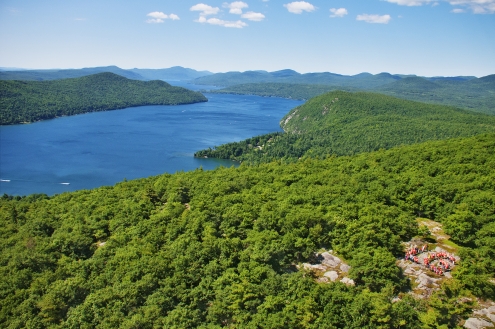
South-facing view over Lake George from Cook Mountain in Ticonderoga taken during the Lake George Land Conservancy’s signature annual event, the Hike-A-Thon. Cook Mountain was LGLC’s first land donation and public preserve. Photo copyright Carl Heilman, II/Wild Visions, Inc.
The Lake George Land Conservancy (LGLC) has achieved land trust accreditation from the Land Trust Accreditation Commission, an independent program of the Land Trust Alliance.
“LGLC’s accredited status demonstrates our commitment to permanent land conservation that benefits the entire Lake George community,” says LGLC Executive Director Nancy Williams. “Our land trust is a stronger organization today having gone through the rigorous accreditation program.”
LGLC is a non-profit land trust based out of Bolton Landing, NY. Since 1988 LGLC has worked with willing landowners and other partners to protect the world-renowned water quality of Lake George and to permanently preserve the natural, scenic, historic and recreational resources of the Lake George region. Since its inception, LGLC’s land protection program has worked directly and with partners to permanently protect nearly 9,500 acres of Lake George wilderness and 6.5 miles of lake shoreline, and manages nine parks and preserves that are open to the public year-round with nearly 25 miles of trails for hiking, snowshoeing, cross-country skiing, and at some preserves, hunting and snowmobiling.
One of LGLC’s current projects includes the development of a management plan for its wildlife refuge in the northeastern region of Lake George. The refuge includes extensive wetlands and forested wildlife habitat, and provides important watershed protection, a trail system for public access, and educational resources for community groups and the general public.
LGLC was awarded accreditation this August and is one of only 280 land trusts from across the country that has been awarded accreditation since the fall of 2008. Accredited land trusts are authorized to display a seal indicating to the public that they meet national standards for excellence, uphold the public trust and ensure that conservation efforts are permanent. The seal is a mark of distinction in land conservation.
“This round of accreditation decisions represents another significant milestone for the accreditation program; the 280 accredited land trusts account for over half of the 20,645,165 acres currently owned in fee or protected by a conservation easement held by a land trust,” said Commission Executive Director Tammara Van Ryn. “Accreditation provides the public with an assurance that, at the time of accreditation, land trusts meet high standards for quality and that the results of their conservation work are permanent.”
Each accredited land trust submitted extensive documentation and underwent a rigorous review. “Through accreditation land trusts conduct important planning and make their operations more efficient and strategic,” said Van Ryn. “Accredited organizations have engaged and trained citizen conservation leaders and improved systems for ensuring that their conservation work is permanent.”
According to the Land Trust Alliance, conserving land helps ensure clean air and drinking water; safe, healthy food; scenic landscapes and views; recreational places; and habitat for the diversity of life on earth. In addition to health and food benefits, conserving land increases property values near greenbelts, saves tax dollars by encouraging more efficient development, and reduces the need for expensive water filtration facilities. Across the country, local citizens and communities have come together to form more than 1,700 land trusts to save the places they love. Community leaders in land trusts throughout the country have worked with willing landowners to save over 47 million acres of farms, forests, parks and places people care about, including land transferred to public agencies and protected via other means. Strong, well-managed land trusts provide local communities with effective champions and caretakers of their critical land resources, and safeguard the land through the generations.
“We are proud to display the accreditation seal,” said Williams, “as recognition of LGLC’s efforts to be a transparent, efficient, and trustworthy organization.”
